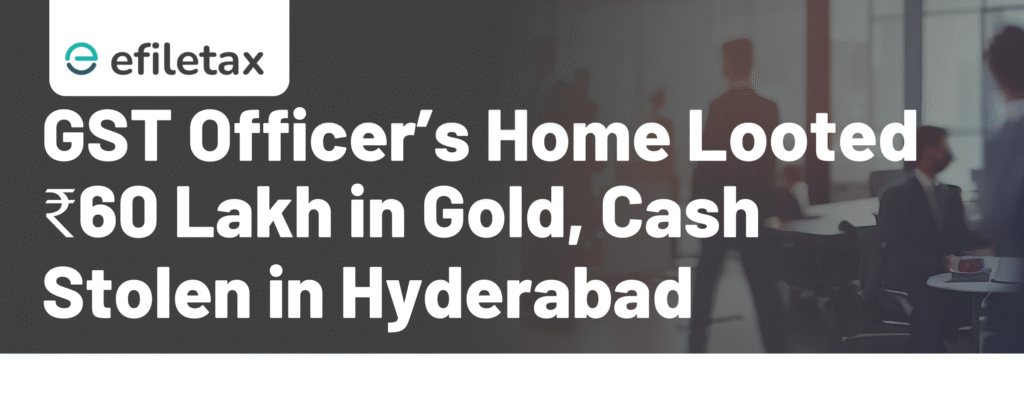
Summary
Burglars looted ₹60 lakh worth of gold, diamonds, and cash from a retired GST officer’s Hyderabad home. This shocking incident raises key questions around asset declaration, income tax scrutiny, and securing high-value movable assets. Learn the legal and financial implications.
GST Officer Burglary in Hyderabad: What Taxpayers Should Learn
In a shocking case from Hyderabad, burglars stole around ₹60 lakh in gold, diamonds, and cash from the residence of a retired GST officer. While the crime is under police investigation, the case also sheds light on broader concerns—asset declaration, income tax scrutiny, and financial safety protocols.
This blog breaks down the tax and legal implications of owning high-value assets and what Indian taxpayers must do to stay compliant.
What Happened?
- Location: Srinagar Colony, Hyderabad
- Victim: Retired Deputy Commissioner of GST
- Stolen items: Over ₹60 lakh in gold, diamonds, and cash
- Investigation: Hyderabad police have registered a case under IPC theft sections
The key concern? The sudden attention this draws to unaccounted wealth, especially when held in cash or jewellery at home.
Key Compliance Lessons from the GST Officer Burglary
1. High-value Assets Must Be Declared
Under Income Tax Act, Schedule AL of ITR (Asset & Liability Schedule):
- Individuals with income above ₹50 lakh must declare movable and immovable assets
- This includes jewellery, bullion, vehicles, shares, bonds, cash in hand
🔎 Non-disclosure can trigger notices under Sections 68 (unexplained cash credits) or 69A (unexplained assets).
2. Cash at Home: Limits and Reporting Rules
- No law prohibits keeping cash, but large amounts (₹10 lakh or more) may raise red flags
- Section 269ST restricts cash transactions above ₹2 lakh per day from a single source
- Section 285BA (SFT reporting) requires banks to report high cash deposits/withdrawals
- During raids, unaccounted cash may be taxed under Section 115BBE at 78% (with cess and penalty)
💡 Tip: Keep proper withdrawal slips, PAN linkage, and transaction trails to justify cash holdings.
3. Jewellery & Gold Holdings: Income Tax Norms
- CBDT Instruction No. 1916 (1994) permits:
- 500g of gold per married woman
- 250g per unmarried woman
- 100g per male member
- Above this limit? Justification needed via ITR filings, inheritance records, purchase bills
🧾 Unexplained jewellery during searches may be seized and taxed under Section 69A.
Legal Angle: What Happens During a Tax Raid?
If authorities suspect undisclosed income or assets:
| Action | Governing Section | Possible Consequences |
|---|---|---|
| Search/Seizure | Section 132, IT Act | Jewellery & cash can be seized |
| Income Reassessment | Section 147 | Reopening of ITR up to 10 years back |
| Penalty | Section 271AAC | 10% of tax payable on unexplained income |
| Prosecution | Section 276C | For willful evasion, up to 7 years imprisonment |
📌 Note: Even gifts above ₹50,000 (not from relatives) may be taxed under Section 56(2)(x).
Expert View: Don’t Wait for a Raid to Clean Your Records
“If you’re holding gold or cash without documentation, you’re inviting trouble—not just theft but tax scrutiny. Regular ITR filing and asset declaration aren’t just legal duties—they’re your best defence.”
— Tax Advisor at Efiletax
How to Stay Compliant and Safe
- ✅ File ITR with accurate asset disclosures
- ✅ Keep digital copies of purchase invoices
- ✅ Avoid high-value cash transactions
- ✅ Invest in bank lockers or insurance for jewellery
- ✅ Declare foreign assets if applicable (Schedule FA)
Subheading with Keyphrase: Income tax scrutiny after burglary – What to expect
While law enforcement focuses on the burglary, the income tax scrutiny after burglary is a real concern. Sudden attention on large cash or jewellery holdings, especially by government officials or professionals, often invites IT Department queries.
If assets are not explained:
- You may receive notices under Section 148
- Assets may be treated as undisclosed income
- Interest and penalty may apply retroactively
FAQs
Q1. Is there a limit to how much cash I can keep at home?
There’s no fixed limit, but large unexplained cash invites IT scrutiny and potential penalties.
Q2. Will insurance cover theft of unaccounted jewellery?
Usually not. Insurers demand purchase bills and declared values.
Q3. What is the tax on unexplained assets found during a raid?
It may be taxed at 78% (Section 115BBE) along with penalties.
Q4. Can a retired officer be investigated for past income mismatch?
Yes. The IT Department can go back up to 10 years if discrepancies are suspected.
Final Words
This unfortunate theft reminds all taxpayers—especially HNIs, professionals, and retired officers—that holding high-value assets requires both physical and legal safeguards. Filing accurate tax returns, maintaining documentation, and staying within legal thresholds are not just compliance steps, but protection measures.